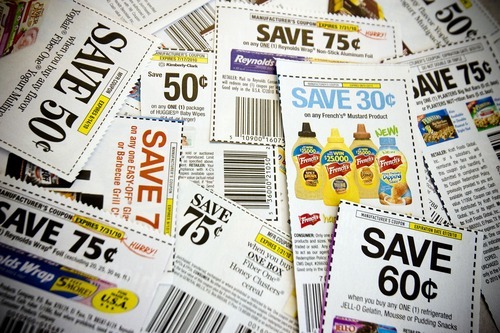This is an archived article that was published on sltrib.com in 2012, and information in the article may be outdated. It is provided only for personal research purposes and may not be reprinted.
Just a few week ago, police say they may have discovered one of the largest cases of coupon fraud in history when they seized more than $25 million worth of fake coupons in Phoenix that were circulated and sold by counterfeiters.
It appears that the coupons were sold online and that a number of people unknowingly purchased them thinking they were legitimate. But by redeeming the fake coupons, those consumers also were breaking the law.
The case illustrates the high level of fraud in the world of couponing and how consumers can unknowingly be lured into illegal or unethical coupon use.
I love using coupons to save money on my family's grocery bill, but there are some things I never do:
Buy coupons • I know a lot of people do this online by going to eBay.com and searching for the word "coupons." But I have never purchased a coupon from anyone for any reason because there is no way to tell whether what you're buying is legitimate. Printing technologies these days mean that counterfeiters can produce authentic-looking coupons.
Not all coupons sold online are fake, of course. Many people purchase extra newspapers or go through Dumpsters and recycling bins to get extra coupons that they sell on various outlets online.
But coupons aren't supposed to be sold. It's prohibited, according to the fine print on most of them. To get around this, those who sell coupons online say they are charging only a "clipping" fee rather than actually accepting money for the coupons. The bottom line for me is that if you give someone money for coupons, then you are buying them, and that's wrong.
Photocopy coupons • This is a common mistake for beginners. Don't photocopy any coupon, even those printed off the Internet. They typically have print limits, which means that only a specific number of coupons are available, and each household is limited to only one or two coupons each, depending on the offer.
Photocopying coupons with unique serial codes is definitely a big no-no. Coupon sites such as Coupons.com, SmartSource.com and Redplum.com track this type of abuse and can bar some consumer's access by blocking their computer or reporting them to authorities.
Print coupons without a unique bar code • Some coupons are distributed in the form of a PDF file that can be printed multiple times. I often avoid these types of coupons because these are among the most likely to be illegally altered or altogether fake. And retailers don't like them. Not only is it difficult for stores to determine whether they are real until they send them in for redemption, but some shoppers have printed out dozens, even hundreds of PDF coupons and have used them to clear entire shelves or bins of merchandise.
Although I'm probably bypassing some savings in the process, I don't even bother with these types of printable coupons anymore.
Share printable coupons • If you print a coupon off the Internet with a unique bar code, be wary of sharing it with anyone else. One reader e-mailed to say she gave a friend a coupon she printed off SmartSource.com that the friend later photocopied and redeemed multiple times. The reader was barred from using the coupon-printing website because of her friend's actions.
Use coupons on the wrong items • Coupon fraud exists in many forms, but one of the most common scams is using coupons on an item other than what the manufacturer intended. Over the past two years, unethical coupon clippers have found every conceivable way to cheat the system.
But by doing so they have spoiled things for everybody (even if they got a moment of fame on national TV). Have you noticed that manufacturers are providing less-valuable coupons these days or that stores have tightened their coupon-acceptance policies?
That's in great part a way to help thwart the hordes of consumers who use coupons in a way they weren't intended.
Print coupons off third-party sites • Awhile back, a reader e-mailed to ask why I hadn't blogged about a coupon worth $5 off one bottle of brand-name shampoo. It was because I was unfamiliar with and couldn't verify the website where she found the coupon.
I went to the nonprofit Couponinformationcenter.com, clicked on "Counterfeit Notifications" and discovered the coupon was actually a fake. If you like to print coupons off the Internet, this site is a great resource to make sure you don't use a fraudulent coupon.
Many scam coupons are abnormally high in value — say $2.25 off a box of Pop Tarts. The goal of many counterfeiters is to create a coupon that allows them to get an item for free — or even to get money back from a retailer.
Remember, if it sounds too good to be true, it probably is.
Lesley Mitchell writes One Cheap Chick in daily blog form at blogs.sltrib.com/cheap.
lesley@sltrib.com Twitter: @cheapchick Facebook: Facebook.com/OneCheapChick



